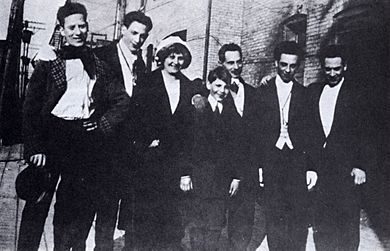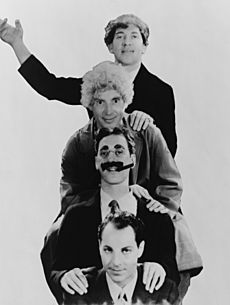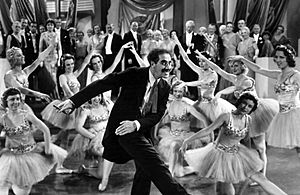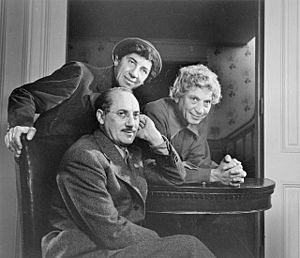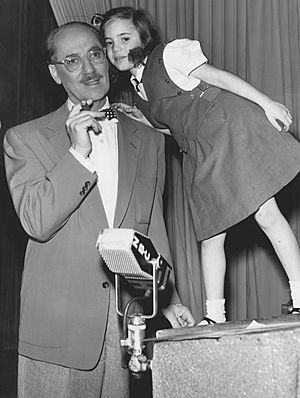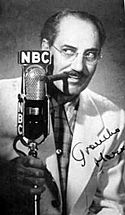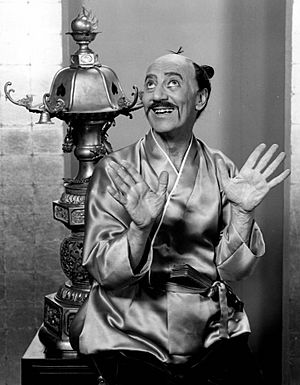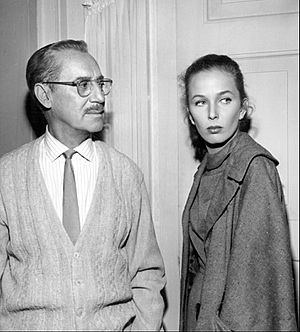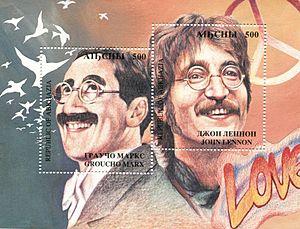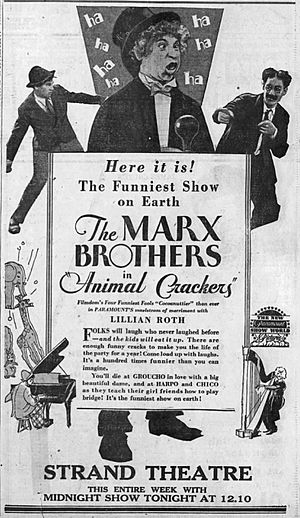Groucho Marx facts for kids
Quick facts for kids Groucho Marx |
|
|---|---|
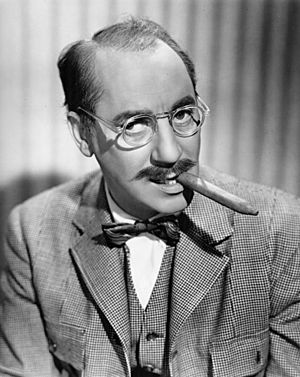
Marx in Copacabana (1947)
|
|
| Birth name | Julius Henry Marx |
| Born | October 2, 1890 Manhattan, New York, U.S. |
| Died | August 19, 1977 (aged 86) Los Angeles, California, U.S. |
| Resting place | Eden Memorial Park Cemetery |
| Medium | Film, television, stage, radio, music |
| Years active | 1905–1976 |
| Genres | |
| Spouse |
|
| Children |
|
| Parent(s) |
|
| Relative(s) |
|
Julius Henry "Groucho" Marx (October 2, 1890 – August 19, 1977) was a famous American comedian, actor, and writer. He was known for his quick wit and is considered one of America's greatest comedians.
Groucho made 13 movies with his brothers, known as the Marx Brothers. He also had a very successful career on his own. He was especially popular as the host of the game show You Bet Your Life on radio and television.
His unique look came from his early days in vaudeville (a type of stage entertainment). It included a hunched posture, glasses, a cigar, and a thick, painted-on mustache and eyebrows. These features led to the creation of a popular funny disguise called Groucho glasses. This mask has fake glasses, a big plastic nose, bushy eyebrows, and a mustache.
Contents
Early Life and Family
Julius Henry Marx was born on October 2, 1890, in Manhattan, New York City. He grew up in a neighborhood called Carnegie Hill on the Upper East Side. His family lived there for about 14 years.
The Marx family was Jewish. His mother, Minnie Schoenberg, came from Germany. His father, Simon "Sam" Marx, was from France and was called "Frenchie." Minnie's brother, Al Schoenberg, became a famous vaudeville performer named Al Shean. Groucho and his brothers looked up to their uncle and sometimes asked him to write jokes for them.
Minnie Marx really wanted her sons to become performers. Even though Julius wanted to be a doctor, he had to leave school at age twelve to help his family earn money. He loved to read and taught himself a lot, even without much formal education.
Start in Show Business
Julius began performing on stage as a boy singer in 1905. He later said he was "hopelessly average" as a performer, but that was just his funny way of talking. By 1909, Minnie Marx put her sons together into a singing group called "The Four Nightingales." They traveled around the U.S. but weren't very popular at first.
After a disappointing show in Texas, Julius and his brothers started telling jokes on stage just for fun. To their surprise, the audience loved their comedy more than their singing! They changed a popular comedy act into their own show called "Fun In Hi Skule." The Marx Brothers performed this type of routine for seven years.
For a while, the brothers used different accents on stage. Julius played a German character with a German accent. But after a ship called the RMS Lusitania sank in 1915, people in America felt angry towards Germans. So, Groucho quickly stopped using the accent. He then developed his famous fast-talking, wise-guy character.
The Marx Brothers became huge comedy stars in vaudeville and on Broadway. By the time they made their first movie, they were already very skilled performers. When Groucho became famous again with his TV show You Bet Your Life, he had already been performing for 50 years!
Career Highlights
Vaudeville and Early Films
Groucho Marx started his career in vaudeville in 1905. By 1909, he and his brothers formed a group. Their mother, Minnie Marx, managed them. The group had a tough start, often performing in bad places and not getting paid. Eventually, his brothers Gummo and Zeppo joined, and the group became known as the Marx Brothers. Their first successful show was Fun In Hi Skule (1910).
Hollywood Success
Groucho made 26 movies, with 13 of them starring his brothers Chico and Harpo. He created his famous character: a quick-witted trickster with a unique "chicken-walking" style, painted-on mustache and eyebrows, and a cigar. He would often make fun of serious women, often played by his friend Margaret Dumont.
Their first movie was a silent film in 1921 that was never released. A decade later, they turned their Broadway hits, The Cocoanuts and Animal Crackers, into movies. Other popular films included Monkey Business, Horse Feathers, Duck Soup, and A Night at the Opera.
Groucho also worked in radio. In 1932, he starred in a short-lived series called Flywheel, Shyster and Flywheel with Chico. Most of the scripts were thought to be lost, but almost all of them were found in 1988.
In 1947, Groucho was asked to host a radio quiz show called You Bet Your Life. It became a TV show on October 5, 1950, and ran for eleven years. The show featured Groucho joking with contestants before asking them questions. It made popular phrases like "Say the secret word and the duck will come down and give you fifty dollars."
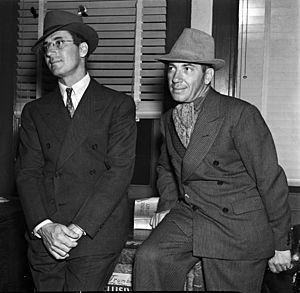
Throughout his career, Groucho introduced many memorable songs in his films, such as "Hooray for Captain Spaulding" and "Hello, I Must Be Going".
His Famous Look
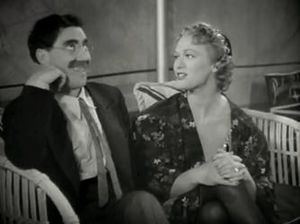
Off-camera, it was hard to recognize Groucho without his famous glasses, fake eyebrows, and mustache. The painted-on mustache and eyebrows started before a vaudeville show in the 1920s. He didn't have time to put on his usual fake mustache, so he just painted one on. He then added paint to his eyebrows to match.
When You Bet Your Life moved to TV, Groucho decided to grow a real mustache instead of painting one on. He wore this real mustache for the rest of his life. By this time, his eyesight was weaker, so he actually needed glasses, which had previously just been a prop.
Groucho's exaggerated walk, with one hand on his lower back and his body bent forward, was a funny copy of a fashion from the 1880s. He made this old style much more extreme for comedic effect.
Personal Life
Groucho Marx was married three times. His first wife was Ruth Johnson, and they had two children, Arthur Marx and Miriam Marx. His second wife was Kay Marvis, and they had a daughter, Melinda Marx. His third wife was actress Eden Hartford.
Even though he didn't have much formal schooling, Groucho wrote many books, including his autobiography, Groucho and Me. He was friends with famous writers like T. S. Eliot. He donated his letters to the Library of Congress.
Groucho also tried to learn to play the guitar. In the 1932 film Horse Feathers, he plays the film's love song "Everyone Says I Love You" on a Gibson L-5 guitar.
In 1937, Groucho played in a celebrity tennis match with Ellsworth Vines against Charlie Chaplin and Fred Perry. Groucho showed up with twelve rackets and a suitcase. He then sat on the court and unpacked a picnic lunch, making everyone laugh.
Later Years
You Bet Your Life
In the mid-1940s, Groucho's career slowed down. His radio show Blue Ribbon Town wasn't successful, and the Marx Brothers had retired from films.
Producer John Guedel saw Groucho on a radio show and had an idea. He asked Groucho to host a quiz show. Groucho joked, "A quiz show? Only actors who are completely washed up resort to a quiz show!" But Guedel explained that the quiz would just be a background for Groucho to talk and joke with the guests. Groucho agreed, saying he would try anything.
You Bet Your Life started on radio in 1947 and moved to TV in 1950. It was a huge hit. With George Fenneman as his announcer, Groucho entertained audiences with his funny, unplanned conversations with guests. The show was recorded beforehand so that funny moments could be found, and anything inappropriate could be removed. The TV show ran for 11 seasons until 1961. The car company DeSoto was a main sponsor.
The show's theme song was "Hooray for Captain Spaulding," which became Groucho's personal theme song.
Other Work
By the time You Bet Your Life started on TV in 1950, Groucho had grown a real mustache.
In 1960, Groucho, who loved the comic operas of Gilbert and Sullivan, played Ko-Ko in a TV production of The Mikado.
Another TV show, Tell It to Groucho, started in 1962 but only lasted five months. In 1962, Groucho introduced Johnny Carson as the new host of The Tonight Show.
In 1965, Groucho starred in a British TV show called Groucho, which was similar to You Bet Your Life. However, it was not well-received and only lasted 11 weeks.
Groucho appeared as a gangster named God in the comedy movie Skidoo (1968). He was in his late 70s and joked that he "looked like I was embalmed."
Groucho became friends with rock stars like Alice Cooper and Elton John, and TV host Dick Cavett. He was a frequent guest on Cavett's talk show. When Elton John met Groucho, Elton said, "Don't shoot me, I'm only the piano player," which became the title of one of Elton John's albums.
In 1972, Groucho performed a live one-man show at Carnegie Hall. In 1974, he received an honorary Academy Award for his amazing comedy work with the Marx Brothers. He thanked his deceased brothers, Harpo and Chico, and also praised Margaret Dumont, a great actress who often played opposite him. Groucho's last appearance was a short sketch with George Burns in a TV special in 1976.
Groucho kept his sense of humor until the very end. When a nurse tried to take his temperature, he joked, "Don't be silly—everybody has a temperature."
Death
Groucho Marx passed away on August 19, 1977, at age 86, from pneumonia. His death was overshadowed by the sudden death of Elvis Presley a few days earlier.
His body was cremated, and his ashes are buried in the Eden Memorial Park Cemetery in Los Angeles. He was survived by his three children and his younger brother Zeppo. Groucho once suggested an epitaph for his gravestone: "Excuse me, I can't stand up."
Legacy
Groucho Marx was the most recognizable of the Marx Brothers. His character has appeared in many parts of popular culture. His trademark glasses, nose, mustache, and cigar are symbols of comedy. Fake glasses with noses and mustaches, known as "Groucho glasses", are sold everywhere.
The cover of The Firesign Theatre's 1969 album, How Can You Be in Two Places at Once When You're Not Anywhere At All, features images of Groucho Marx and John Lennon.
Nat Perrin, a friend and writer for the Marx Brothers, helped inspire John Astin's portrayal of Gomez Addams on The Addams Family TV show. Gomez had a similar mustache, eyebrows, and cigar.
Minnie's Boys, a 1970 Broadway musical, was about the younger years of Groucho and his brothers. Groucho himself was an advisor for the show.
In 1972, Groucho received a French honor called the Ordre des Arts et des Lettres, which he was very proud of.
Groucho also influenced the Warner Bros. cartoon character Bugs Bunny. Bugs would sometimes say Groucho's famous line, "Of course you realize this means war!"
Two albums by the British rock band Queen, A Night at the Opera (1975) and A Day at the Races (1976), are named after Marx Brothers films. In 1977, Groucho invited Queen to visit him in Los Angeles.
A long-running ad campaign for Vlasic Pickles features an animated stork that acts and sounds like Groucho. On the famous Hollywood Sign, one of the "O"s is dedicated to Groucho Marx. Alice Cooper helped pay to remodel the sign in memory of his friend.
Actor Frank Ferrante has performed as Groucho Marx on stage since 1986. He continues to tour in a show called An Evening with Groucho.
In the Hungarian version of Woody Allen's film Annie Hall, a famous quote is given to Buster Keaton instead of Groucho Marx. This was because in communist Hungary, the name 'Marx' was linked to Karl Marx and couldn't be used in a funny way.
Woody Allen's 1996 musical Everyone Says I Love You is named after one of Groucho's songs. It ends with a Groucho-themed New Year's Eve party where some stars dress up as Groucho.
In the Italian horror comics series Dylan Dog, a supporting character named Groucho is a Groucho Marx impersonator.
Filmography
Features
| Title | Year | Role | Notes | |
|---|---|---|---|---|
| Humor Risk | 1921 | Villain | Never released; believed to be lost | |
| The Cocoanuts | 1929 | Hammer | Based on a Marx Brothers musical | |
| Animal Crackers | 1930 | Captain Jeffrey Spaulding | Based on a Marx Brothers musical | |
| The House That Shadows Built | 1931 | Caesar's Ghost | Short promotional film | |
| Monkey Business | 1931 | Groucho | ||
| Horse Feathers | 1932 | Professor Quincy Adams Wagstaff | ||
| Duck Soup | 1933 | Rufus T. Firefly | ||
| Post-Zeppo | ||||
| A Night at the Opera | 1935 | Otis B. Driftwood | ||
| A Day at the Races | 1937 | Dr. Hugo Z. Hackenbush | ||
| Room Service | 1938 | Gordon Miller | Based on a Broadway play | |
| At the Circus | 1939 | J. Cheever Loophole | ||
| Go West | 1940 | S. Quentin Quale | ||
| The Big Store | 1941 | Wolf J. Flywheel | Intended to be their last film | |
| A Night in Casablanca | 1946 | Ronald Kornblow | ||
| Love Happy | 1949 | Detective Sam Grunion | ||
| Showdown at Ulcer Gulch | 1957 | Stage Conductor (voice) | Cameo appearance | |
| The Story of Mankind | 1957 | Peter Minuit | Cameo appearance | |
| General Electric Theater | 1959 | Suspect in a Police Lineup | Episode: "The Incredible Jewel Robbery" | |
| Title | Year | Role | Notes |
|---|---|---|---|
| Yours for the Asking | 1936 | Sunbather | Uncredited cameo |
| The King and the Chorus Girl | 1937 | N/A | Co-writer |
| Instatanes | 1943 | Unknown | |
| Copacabana | 1947 | Lionel Q. Deveraux | |
| Mr. Music | 1950 | Himself | |
| You Bet Your Life | 1950–61 | Himself (host) | Quiz show |
| Double Dynamite | 1951 | Emile J. Keck | |
| A Girl in Every Port | 1952 | Benjamin Linn | |
| Will Success Spoil Rock Hunter? | 1957 | George Schmidlap | Uncredited |
| The Bell Telephone Hour | 1960 | Ko-Ko | Episode: "The Mikado" |
| General Electric Theater | 1962 | John Graham | Episode: "The Hold-Out" |
| Bob Hope Presents the Chrysler Theatre | 1964 | Ed Davis | Episode: "Time For Elizabeth" |
| I Dream of Jeannie | 1967 | Himself | Episode: "The Greatest Invention in the World" |
| Skidoo | 1968 | God | |
| Julia | 1968 | Mr. Flywheel | Episode: "Farewell, My Friends, Hello" |
Short subjects
- Hollywood on Parade No. 11 (1933)
- Screen Snapshots Series 16, No. 3 (1936)
- Sunday Night at the Trocadero (1937)
- Screen Snapshots: The Great Al Jolson (1955)
- Showdown at Ulcer Gulch (1956) (voice)
- Screen Snapshots: Playtime in Hollywood (1956)
See also
 In Spanish: Groucho Marx para niños
In Spanish: Groucho Marx para niños
 | Tommie Smith |
 | Simone Manuel |
 | Shani Davis |
 | Simone Biles |
 | Alice Coachman |


